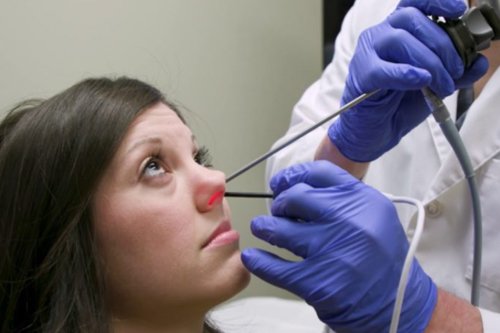Brain and ENT Clinic – Dr Lalit Mahajan In Nagpur & Dr Rachna Gangwani Mahajan In Nagpur
Nasal Endoscopy in Nagpur

Nasal Endoscopy in Nagpur is a diagnostic procedure use by ear, nose, and throat (ENT) specialists to examine the nasal passages and the interior of the nose. It involves the use of a thin, flexible tube call an endoscope, which has a light and a tiny camera on its tip. This allows the ENT specialist to visualize and assess the nasal and sinus structures in detail.
Endoscope Insertion:
- The ENT specialist gently inserts the endoscope into one of the nostrils. The endoscope is flexible and minimally invasive, causing minimal discomfort.
Visualization:
- As the endoscope is advance through the nasal passages, the light & camera on the tip provide a real-time, magnifie view of the nasal structures on a monitor.
Types of Nasal Endoscopy
Anterior Rhinoscopy:
- This is a basic form of nasal endoscopy where the endoscope is insert into the nostril to visualize the anterior (front) part of the nasal cavity.
Diagnostic Nasal Endoscopy:
- This is a comprehensive examination of the nasal cavity and sinus openings using a flexible or rigid endoscope.
Functional Endoscopic Sinus Surgery (FESS):
- FESS is a minimally invasive surgical procedure that uses nasal endoscopy to treat chronic sinusitis and other sinus disorders.
Nasopharyngoscopy:
- This type of endoscopy involves examining the nasal passages, nasopharynx, and the back of the throat.
Video Nasal Endoscopy:
- Video nasal endoscopy involves using a small camera at the end of the endoscope to record real-time video footage of the nasal structures.
Balloon Sinuplasty:
- While not strictly a type of nasal endoscopy, balloon sinuplasty is a procedure often performe in conjunction with endoscopy.
Office-Base Nasal Endoscopy:
- Some nasal endoscopies are performe in the office setting without the need for sedation or anesthesia.
Symptoms of Nasal Endoscopy
Nasal Congestion:
- Persistent or recurrent nasal congestion that does not respond to over-the-counter decongestants.
Chronic Sinusitis:
- Symptoms such as facial pain or pressure, headache, postnasal drip, and a persistent stuffy or runny nose.
Difficulty Breathing:
- Chronic difficulty breathing through the nose, which may be associate with a deviate septum, nasal polyps, or other structural issues.
Recurrent Sinus Infections:
- Frequent or recurrent sinus infections, which may be indicative of underlying sinus issues.
Nasal Polyps:
- Symptoms may include nasal obstruction, a reduce sense of smell, or a runny nose.
Epistaxis (Nosebleeds):
- Unexplained or recurrent nosebleeds may prompt a nasal endoscopy to identify the source of bleeding.
Treatments
Medical Management:
- Antibiotics: Once, If a bacterial infection is detected, such as in cases of acute sinusitis, antibiotics may be prescribe to clear the infection.
- Corticosteroids: Thus, Nasal corticosteroid sprays may be recommende to reduce inflammation in the nasal passages, particularly in conditions like allergic rhinitis or nasal polyps.
Nasal Decongestants:
- Thus, Short-term use of nasal decongestants may be advise to alleviate nasal congestion, especially in cases of acute sinusitis or nasal obstruction.
Allergy Management:
- Firstly, If nasal endoscopy reveals signs of allergic rhinitis, allergen avoidance strategies, antihistamines, or allergy shots (immunotherapy) may be recommended.
Nasal Irrigation:
- Thus, Saline nasal irrigation, using a saline solution or a nasal spray, may be suggested to help clear mucus and reduce nasal congestion.
Septoplasty:
- Once, If a deviate septum is identifie as the cause of nasal obstruction, septoplasty may be recommende. Septoplasty is a surgical procedure to straighten the nasal septum, improving airflow.
Functional Endoscopic Sinus Surgery (FESS):
- Therefore, In cases of chronic sinusitis, nasal polyps, or other sinus disorders, functional endoscopic sinus surgery (FESS) may be considered. FESS is a minimally invasive surgical procedure performe with the assistance of an endoscope to open blocke sinus passages and improve drainage.
Polypectomy:
- Thus, If nasal polyps are identifie, a polypectomy may be performed to remove the non-cancerous growths and improve nasal airflow.
